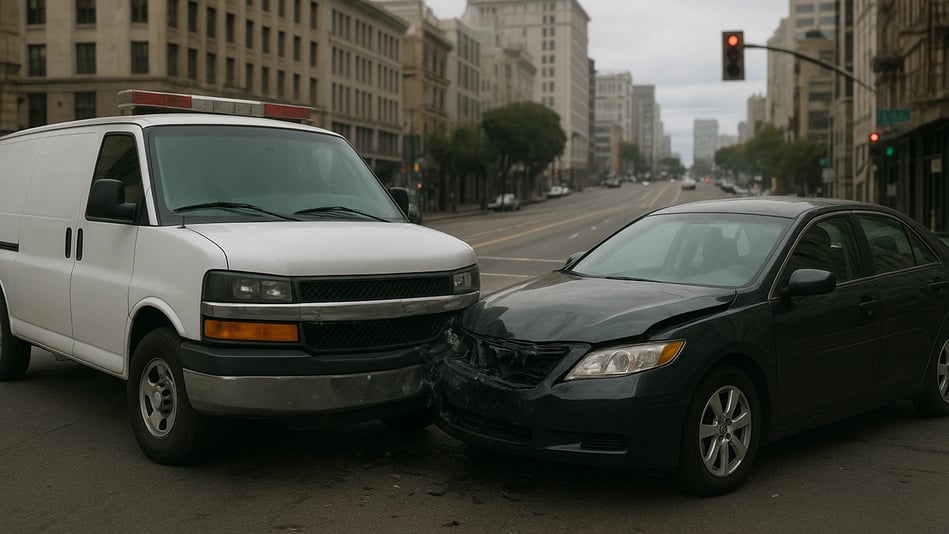San Francisco Jury Clears AMR in 2022 Ambulance Crash Case

Table of Contents
Case Background
In a civil action that spanned over two years in the Superior Court of California, County of San Francisco, Plaintiff Adam O’Connor sought compensation for injuries he suffered in a motor vehicle accident. The case, pitted O’Connor against two primary defendants: Scott Newlin Jr. and the American Medical Response Ambulance Service, Inc. (AMR). The core of the dispute concerned a collision that took place in San Francisco on August 4, 2022. O’Connor claimed that the defendants’ negligence caused the crash, which resulted in his physical injuries and financial losses.
Cause
The lawsuit centered on a negligence claim arising from a vehicular collision. O’Connor stated that the defendants had negligently owned, operated, maintained, entrusted, and/or controlled a vehicle, causing it to collide with his own. He specifically contended that the defendants breached their legal duty to him as a fellow driver and that this breach was the actual and proximate cause of his resulting damages. While the complaint named Scott Newlin Jr. and American Medical Response Ambulance Service, Inc., the proceedings later focused heavily on the actions of the corporate defendant, AMR.
Injury
Following the collision, O’Connor sought to recover for a wide range of injuries and damages. He alleged that he suffered general, special, actual, and compensatory damages. These included necessary medical and related expenses incurred in the past, present, and future, as well as a significant impact on his life beyond just the physical harm.
Damages Sought
The plaintiff’s filing indicated a demand for damages that would be proven at trial. Specifically, O'Connor sought to recover for:
Past, present, and future lost earnings.
Loss of future earning capacity.
Mental, emotional, and physical pain and suffering.
Medical and related expenses.
Key Arguments and Proceedings
The trial unfolded over several weeks, culminating in a jury verdict in April 2025. The proceedings required the jury to first establish whether the defendants had been negligent and, if so, whether that negligence was a substantial factor in causing harm to O'Connor. The defense, in turn, challenged the extent of the harm and placed scrutiny on the plaintiff’s own conduct in the moments leading up to the crash.
Legal Representation
Plaintiff(s): Adam O'Connor
· Counsel for Plaintiff(s): Michael Shemtoub
Defendant(s): Scott Newlin Jr. | American Medical Response Ambulance Service, Inc
· Counsel for Defendant(s): Maria M. Lampasona
Key Arguments or Remarks by Counsel
Claims
O'Connor’s legal team had consistently maintained that the ambulance service's employee acted carelessly while operating the vehicle, directly leading to the crash. They argued that the company, AMR, should be held responsible for the driver's actions because the driver was acting within the scope of their employment. The core assertion was that the defendant's failure to operate their vehicle safely constituted a clear breach of duty owed to the motoring public.
Defense
The defense, primarily represented by counsel for AMR, mounted a firm opposition to O’Connor’s claims. Their strategy had two main prongs: first, they challenged the assertion that the AMR driver’s actions constituted negligence that was a substantial factor in the collision. Second, they introduced the concept of comparative fault, suggesting that O'Connor himself had contributed to the accident through his own negligence. The defense sought to minimize the responsibility assigned to AMR and, by extension, any damages awarded.
Jury Verdict
The jury in the case of Adam O'Connor v. Scott Newlin Jr. et al. after a trial concerning a collision with an ambulance service vehicle, delivered a definitive verdict for the defense on April 24, 2025, when they determined that the corporate defendant, American Medical Response Ambulance Service, Inc. (AMR), was not negligent. This singular finding, which was the first question on the verdict form, immediately halted deliberations, meaning the jurors never reached the subsequent questions of whether AMR's actions caused the plaintiff's harm, whether Plaintiff Adam O'Connor was also negligent, or what the amount of damages should be for his claimed injuries and losses. By answering "No" to the question of AMR's negligence, the jury effectively established that the foundation of the plaintiff's entire claim had failed, resulting in a judgment in favor of the defendants.